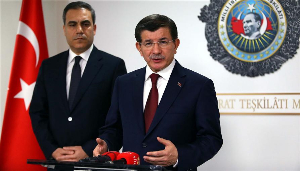The AKP Uses the “Solution Process” to Suspend the Freedom of Expression
By Burak Bilgehan Özpek (vol. 7, no. 21 of the Turkey Analyst)
The strategies of the Turkish state to deal with the Kurdish question has undergone a dramatic change since the 1990s, but what has remained constant is the state’s stance toward freedom of expression. The ruling party of Turkey has repeatedly demonstrated that it uses lofty goals like democratization to severely restrict the freedom of expression and to suspend the rule of law. “Peace” is another such goal. The AKP’s strategy in the “solution process” with the Kurdish movement rests on keeping the process secret, and stigmatizing and intimidating those who raise questions. The AKP’s strategy indicates that “peace” can be just as viable as a strategy to secure and defend authoritarian power as armed conflict.

Fighting Blind: the AKP's Increasingly Hardline Kurdish Policy
By Gareth H. Jenkins (vol. 5, no. 17 of the Turkey Analyst)
On August 28, 2012. Selahattin Demirtaş, the co-chair of the pro-Kurdish Peace and Democracy Party (BDP), declared that the Kurdistan Workers’ Party (PKK) had usurped the authority of the Turkish state over an area of 400 square kilometers of the district of Şemdinli, close to the Iraqi border. The claim was exaggerated, in terms of geographical extent and the degree of PKK control. But there is little doubt that in recent months the Turkish security forces have been losing ground on the battlefield. However, even if the military eventually regains the upper hand, in the longer term Prime Minister Recep Tayyip Erdoğan’s insistence on pursuing hard-line policies seems likely only to strengthen the PKK, More critically, the continuing rise in anti-Kurdish racism and ethnic violence suggests that, whatever happens in the PKK insurgency, an even more important war could be lost.
Values and Identity: the Resurgence of the Kurdish Hizbullah
By Gareth H. Jenkins (vol. 5, no. 9 of the Turkey Analyst)
On April 22, 2012, hundreds of thousands of people gathered in the center of Diyarbakır, the largest city in the predominantly Kurdish southeast of Turkey, for a celebration of the Prophet Muhammad’s birth. The event was organized by a coalition of NGOs affiliated with the radical Sunni Islamist organization known in Turkey as Hizbullah (which is unrelated to the Lebanese Shia organization with the same name), which many assumed to have been crippled by the killing of its founder Hüseyin Velioğlu in January 2000. However, Hizbullah’s ability to mobilize such a huge number of people suggests that it has not only recovered but is now stronger than ever. Its ability to combine a strong commitment to conservative Islamic values with an advocacy of Kurdish cultural and political rights looks set to pose a serious challenge not only to the ruling Justice and Development Party (AKP) but also to more secular Kurdish organizations such as the Peace and Democracy Party (BDP) and the militant Kurdistan Workers’ Party (PKK).
Reinventing a Broken Wheel: the AKP's New Kurdish Strategy
By Gareth H. Jenkins (vol. 5, no. 7 of the Turkey Analyst)
On 21 March 2012, Turkish government officials began briefing trusted journalists on what they described as the new strategy of the ruling Justice and Development Party (AKP) for solving the country’s long-running Kurdish problem. As more details emerged over the days that followed, it became clear that, far from raising hopes of future success, the AKP’s “new strategy” was more reminiscent of past failures; namely the discredited policies of denial and confrontation that had not only failed to resolve the Kurdish issue but had played a key role in boosting popular support for the violent insurgency of the Kurdistan Workers’ Party (PKK).
The Secret MiT-PKK Talks: Was a Turkish-Kurdish Peace Accord Ever Close?
By Halil M. Karaveli (vol. 4, no. 18 of the Turkey Analyst)
As the Turkish-Kurdish conflict escalates, the release of a 50-minute tape recording of a meeting between leading officials of the Turkish National Intelligence Agency (MİT) and the Kurdistan Workers’ Party (PKK) has supplied insights into the strategy of the Turkish government. The effort to explore a peaceful solution was doomed because ultimately the ruling AKP has not disengaged from Turkish state tradition. The AKP state does have a more tolerant approach than the defunct Kemalist state, but it is nonetheless still a patronizing state that expects societal obedience. The AKP government thus never engaged in an earnest negotiation with the Kurdish representatives.



